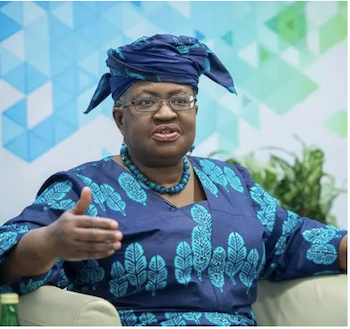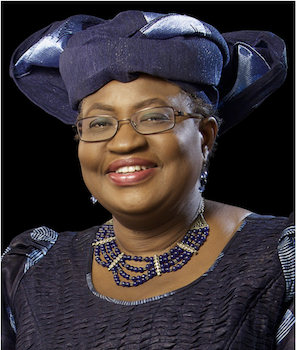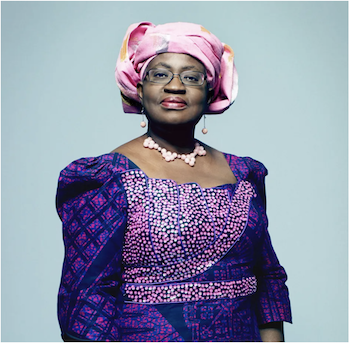
Considered to be one of the most powerful women in the world, Ngozi Okonjo-Iweala is renowned for her contributions to Nigeria’s economy and international economic organizations. Nicknamed “Okonjo Wahala,” she is regarded as an uncompromising figure, having forged a career in which she has accomplished many firsts.
Okonjo-Iweala was born in Ogwashi-Ukwu, Delta State, Nigeria on June 13, 1954. Her father, Professor Benjamin Kachukwu Okonjo, was a mathematician and economist as well as the traditional ruler (obi) of Ogwashi-Ukwu, an Igbo town in Delta State, and her mother, Professor Kamene Okonjo, was a sociologist. She has six siblings, one of whom, Ifechukwude Anishi Okonjo II, is the current obi of Ogwashi-Ukwu. Until the age of nine, Okonjo-Iweala was raised by her grandmother, as her parents were earning their degrees abroad. Not much is known about her early education, but during her secondary school years, she attended Queen’s School, Enugu; St. Anne's School, Molete, Ibadan; the International School Ibadan. Her interest in economics peaked at a very young age. She recalls that one day, when she was disturbing her father as he worked, he gave her an economics book to read and told her that he would quiz her on the first chapter. Okonjo-Iweala remembers, “It was so boring! I was reading it and crying, then decided with deep resolve that I wouldn’t go near economics again.” However, she did.
Although Okonjo-Iweala’s godmother had wanted her to attend the University of Cambridge, which accepted her, her mother was going to Boston to earn her Ph.D., and since Okonjo-Iweala was a teenager, her family overruled her godmother. In 1973, she left Nigeria to attend Harvard University, graduating magna cum laude with an AB in economics in 1976. She then attended the Massachusetts Institute of Technology where, in 1981, she received a Ph.D. focused on regional economics and development. Her thesis was titled “Credit policy, rural financial markets, and Nigeria's agricultural development.”
Today, she is married to Dr. Ikemba Iweala, a neurosurgeon, with whom she has one daughter, Onyinye Iweala, and three sons: Uzodinma Iweala, Okechukwu Iweala, and Uchechi Iweala.

Okonjo-Iweala began her career at the World Bank—where she would spend 25 years—as a developmental economist before ascending to the No. 2 position of Managing Director of Operations in 2007. In this role, she oversaw an $81 billion operational portfolio in Africa, South Asia, Europe, and Central Asia. Before assuming this position, however, she served as the Nigerian Finance Minister in President Olusegun Obasanjo’s cabinet from 2003 to 2006. She also briefly served as the Minister of Foreign Affairs in 2006. These appointments made her the first woman to hold either position.
As Finance Minister, in 2005, she spearheaded negotiations between Nigeria and the Paris Club that resulted in the country receiving $18 billion worth of debt relief—around 60% of its Paris Club debt—and a $30 billion reduction in the country’s debt stock. Because of these efforts, Nigeria succeeded in paying off its remaining Paris Club debt the following year. While the negotiations were ongoing, Okonjo-Iweala, showcasing her indomitable nature, exclaimed, “The road is hard and long… No one can guarantee that we’ll get debt relief. We might make all the efforts and still not get it. But there is no reason why we shouldn’t try our very best to qualify and then leave the rest in God’s hands!"
In 2007, Okonjo-Iweala wrote a 15-page paper for the Brookings Institution detailing the process of securing the Paris Club debt relief. She explained that her strategy during the negotiations was one of “persuasion focused on getting attention on [Nigeria’s] important economic reforms rather than pleading for debt relief.” During her meeting with British Prime Minister Gordon Brown, she emphasized Nigeria’s economic reform programs, noting that she did not ask for his backing until the programs progressed suitably. This tactic ensured that Brown would have a palpable interest in Nigeria’s success.
At the end of the Obasanjo presidency, she returned to the World Bank, assuming the position of Managing Director of Operations. She held this role until 2011, when she was appointed finance minister in President Goodluck Jonathan’s administration. In 2012, amidst her efforts to fight institutional corruption, her mother, Kamene Okonjo, was kidnapped and held hostage for five days. Okonjo-Iweala alleged that the four kidnappers had called her and demanded that she appear on television announcing her resignation. She also claimed that they were in cahoots with oil marketers who were furious at her fuel subsidies, with some allegedly holding a meeting in Lagos where they proclaimed that she would “leave the office in a wheelchair.” Undeterred, Okonjo-Iweala remained in office and served out her full 4-year term, despite being barraged with calls to resign. In 2018, when interviewed about the events surrounding the kidnapping, Okonjo-Iweala doubled down on her commitment to fighting corruption, arguing that threats should not dissuade one from pursuing a noble cause.

In June 2020, Nigeria nominated Okonjo-Iweala for the position of Director-General of the World Trade Organization (WTO). Although she received support from 163 member-nations, the United States opposed her candidacy, citing her lack of trade experience. With a change in administration in 2021, however, the United States signaled its support of her after the withdrawal of her sole opponent, the Republic of Korea’s Trade Minister Yoo Myung-hee. Upon publicization of Okonjo-Iweala’s selection as Director-General, European Central Bank President Christine Lagarde remarked, “She is this wonderful, soft, very gentle woman with an authentic approach to problems but, boy, under that soft glove there is a hard hand and a strong will behind it. She is going to rock the place.” Okonjo-Iweala’s selection made her the first woman and first African to lead the WTO.
Prior to her assumption of the Director-General position, Okonjo-Iweala served as a Senior Adviser to Lazard and sat on the boards of Gavi, the Vaccine Alliance, African Union's African Risk Capacity (ARC), Standard Chartered PLC, and Twitter Inc. She also co-chaired The Global Commission on the Economy and Climate and is a nonresident distinguished fellow with the Africa Growth Initiative in the Global Economy and Development program at the Brookings Institution.
A testament to her professional success, Okonjo-Iweala has received numerous awards from global publications. She appeared on Forbes’ Top 100 Most Powerful Women in the World list in 2011, 2012, 2013, 2014, 2022 and 2023. She was also ranked as one of the 50 Greatest World Leaders in 2015, one of the Top 100 Most Influential People in the World in 2014, and one of the Top 100 Women in the World in 2011 by Forbes, Time, and the U.K. Guardian respectively. In addition, Forbes named her its African of the Year in 2020. She has also published many articles and several books, some of which are Reforming the Unreformable: Lessons from Nigeria, Fighting Corruption Is Dangerous, and Women and Leadership: Real Lives, Real Lessons.
Living up to the meaning of her name, Dr. Ngozi Okonjo-Iweala is a blessing to Nigeria and the world at large. She has inspired a generation of women as she continues to achieve milestones previously considered impossible for African women. Okonjo-Iweala and her legacy are a reminder to Nigerian women that no career dream is truly unattainable.
Why Did I Choose to Research Ngozi Okonjo-Iweala?
As a fellow Nigerian woman, I look up to Ngozi Okonjo-Iweala because she has broken many glass ceilings in her field—a feat I hope to achieve in the future. As a girl raised in Nigeria, I experienced misogyny in the classroom, with teachers often considering my feminism a youthful rebellion. The idea that my primary responsibility as a woman is to marry and birth children always seemed silly to me. Yes, I want to have children, but I also want to have the best career possible. The two are not mutually exclusive. Dr. Ngozi Okonjo-Iweala has shown me and many other girls that we must not sacrifice our careers to have a family—the two can co-exist. I am unwavering in my ambition because I have seen women like her accomplish the very things I want to achieve. Her determination and ambition inspire me to continue on the path I have chosen, and she serves as a constant reminder that anything is possible with faith and hard work.
Fun Fact: She attended the same secondary school as my mom and my aunt (Queen’s School), which I find really cool!
Works Cited
African American Registry. Ngozi Okonjo-Iweala, Economist born. https://aaregistry.org/story/ngozi-okonjo-iweala-economist-born/
Baschuk, B. (2021, February 20). A Nigerian corruption fighter nicknamed ‘Okonjo the trouble maker’ could shake up the WTO. https://www.seattletimes.com/business/a-nigerian-corruption-fighter-nicknamed-okonjo-the-trouble-maker-could-shake-up-the-wto/
BBC News Pidgin. (2021, February 16). Ikemba Iweala Ngozi Okonjo-Iweala husband: WTO Director General - Meet di husband of di first woman to head World Trade Organization. https://www.bbc.com/pidgin/world-56070277
Falayi, K. (2021, March 1). Ngozi Okonjo-Iweala makes history at WTO. https://www.bbc.com/news/world-africa-54903788
Forbes Woman Africa. The accidental economist: Dr. Ngozi Okonjo-Iweala. https://www.forbesafrica.com/woman/2013/11/01/accidental-economist-dr-ngozi-okonjo-iweala/
MacTutor History of Mathematics Archive. Chukwuka Benjamin Okonjo. https://mathshistory.st-andrews.ac.uk/Biographies/Okonjo/
Office of the United States Trade Representative. (2021, February 5). Office of the United States Trade Representative Statement on the Director General of the World Trade Organization. https://ustr.gov/about-us/policy-offices/press-office/press-releases/2021/february/office-united-states-trade-representative-statement-director-general-world-trade-organization
Okonjo-Iweala, N. (2007). Nigeria’s Fight For Debt Relief: Tracing The Path. https://www.brookings.edu/wp-content/uploads/2012/04/2007okonjoiweala.pdf
The Brookings Institution. Ngozi Okonjo-Iweala. https://www.brookings.edu/people/ngozi-okonjo-iweala-2/
TheCable. (2018, May 18). Okonjo-Iweala: Why I didn’t resign from Jonathan’s govt. https://www.thecable.ng/okonjo-iweala-didnt-resign-jonathans-govt/
WokeNation TV News. (2022, September 14). Ngozi Okonjo Iweala Reveals The Reason Behind Her Mother's Kidnap During Her Time As Nigeria's Finance Minister [Video]. Facebook. https://www.facebook.com/wokenationtvnews/videos/ngozi-okonjo-iweala-reveals-the-reason-behind-her-mothers-kidnap-during-her-time/1154896888432475/
This article was published on 9/18/24